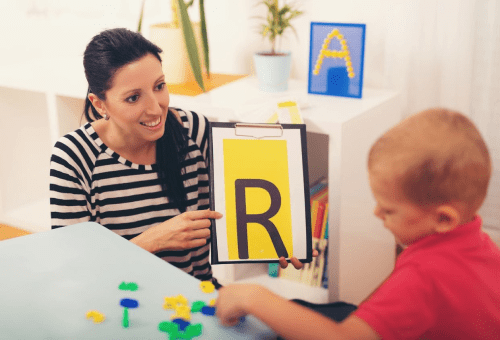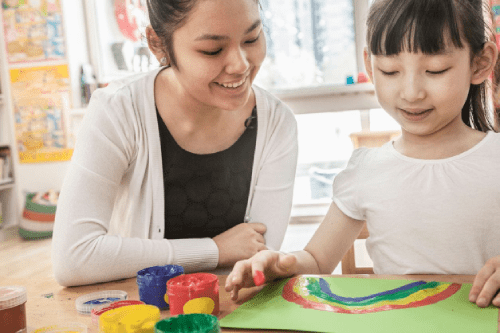What We Offer
ABA THERAPY
Applied Behavior Analysis (ABA), is a therapy based on the science of learning and behavior. At Westside, we use ABA to affect a desired change in how a child learns and interacts with the world around them.
Depending on the focus, our behavior analysts will begin one-on-one with your child in a highly structured clinical environment with the goal of moving toward a less-structured clinical environment.
Continually researched, applied, and improved over the last three decades, promoted by the Center for Disease Control and endorsed by the U.S. Surgeon General. (1999), ABA therapy is the most successful strategy for teaching children with disabilities. Our professional experience, current literature, and the newest research have confirmed that our methods and practices are a very effective way to modify behavioral responses in children with emotional and/or developmental challenges.


WE SPECIALIZE IN EARLY INTERVENTION
As every child is different, we develop individualized programs tailored to meet specific needs. While using the principles of Applied Behavior Analysis and Verbal Behavior, we apply curriculum and assessment tools to assess skill strengths and deficits and guide program development. Data is taken before and throughout ABA therapy. Our behavior analysts regularly revise individual therapy practices to ensure continued progress. Skills are taught systematically to ensure effective translation in your child’s natural environment.
WE DO MORE...
We target communication to decrease challenging behaviors and increase the use of language. We utilize a variety of Evidence-Based Practices (EBPs), augmentative and alternative communication (AAC), and can work closely with your child's speech therapist to encourage communication and language development.
We track behavior data to decrease challenging behaviors and implement transition-building exercises into programs.
We help facilitate and cultivate positive peer interaction from the beginning, sometimes even starting with simple proximity exercises. In our center-based environment, your child will have access to multiple similarly-aged peers in order to engage and practice new and developing social skills.
We include the whole family in our ABA programs, and may conduct parent and sibling training to ensure consistency in programs.
Our ABA programs can promote and target appropriate play skills while diminishing challenging behaviors.
We incorporate Natural Environment Training (NET) into programs in addition to creating task schedules for everyday life skills.
While program goals are as diverse as our clients, we target transitioning our kids into schools whenever possible.
If everyday outings and trips can be difficult, we may implement NET outings to accustom our clients to routine flexibility.
We use data tracking and daily schedules to make potty training a success.
Our ABA therapists collaborate with your child's Occupational, Speech, and/or Physical Therapist to work toward goals as part of a collective treatment team.
While emphasizing ability, we may incorporate pre-academic skills into our client's programs.
Getting Started
When your child is diagnosed with a developmental disability, it can be very overwhelming. As a parent, or a family member living with someone who’s been recently diagnosed with Autism Spectrum Disorder (ASD), you face daily challenges that don’t impact other families. You may face more demands on your time, energy and even finances than other families do. You may not know where to turn for support. Westside Behavior Therapy can help you get started on your journey. We’ve put together this guide to outline some of the first steps you can take.
- Most importantly, it’s crucial to pursue needs-based care. The needs of the child are very important, but the needs of the caregivers and family must also be considered.
- To obtain the best care, seek Applied Behavior Analysis (ABA) therapy with a Board Certified Behavior Analyst (BCBA). Applied Behavior Analysis (ABA) therapy uses the well-established principles of learning to decrease challenging behaviors and increase communication and life skills. This treatment is a research-based intervention for helping children and adolescents with autism and other developmental disabilities. The emphasis is on proven outcomes.
- Secure educational services, available either through the state Department of Education or Department of Health. A local regional center or community-centered board (CCB) can also be helpful in identifying the local, state and federally funded programs for people with developmental disabilities. Community-centered boards serve as liaisons between the Department of Health and in some cases the Department of Education funding and community resources.
- Clarify insurance coverage or financial assistance. Start by talking with the employee benefit manager at your place of employment. This professional can help determine if certain disabilities are deemed medically necessary to treat. Oregon has health insurance mandates for the behavioral treatment of children with autism. If insurance will not cover treating the disability, it’s very important to appeal on behalf of the child.
- Seek family/community support. Many communities have support groups for parents and children with Autism Spectrum Disorder (ASD) or other developmental disabilities. These include the Autism Society or the Down’s Syndrome Association. There are also many online social media groups for specific disabilities.
At Westside Behavior Therapy, our goal is to help children on the autism spectrum live full and meaningful lives. We help by providing individualized clinical services. As a devoted, capable partner, we'll provide compassionate care coupled with professionalism and skilled training. We combine expertise and knowledge with clinical, technical, and interpersonal skills to achieve successful behavioral outcomes …all with the goal of supporting your family.
To begin, we work with you to create an individualized behavior program for your child based on what we learn from behavioral interviews and scientifically validated assessments. This information serves as a baseline as we fine-tune the treatment plan with additional observations. Our programs reflect the latest research on behavioral treatment and are based on Applied Behavior Analysis (ABA).
